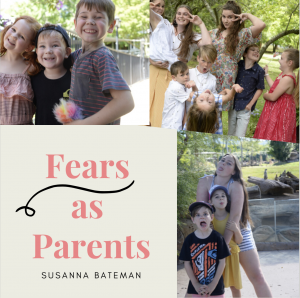Fears as Parents
When you put it into perspective, fears are a big part of what we call the rollercoaster ride. Fears that we feel as parents can be so varied but are so real for the people who are feeling them. The fear that you feel when you bring that first newborn baby home and are constantly checking if they’re breathing is a real fear. The fear when your child has a real significant health challenge is also a real fear. Both of these are valid and are just as big as one another.
Fear is a big component of the parenting journey, however sometimes we have fears that we don’t really need to have. Some will be easier to overcome than others. Every child is completely different so what helps us overcome fears with one child can be very different when it comes to another child. This also includes teaching our children to overcome their own fears as well. There is no black and white or magical answer when it comes to fears. The one thing we can all do is admit that we have the fear. When we admit to our fears then we can begin to work through them. If we don’t recognise what the fear is then it can begin to consume us.
Fear can be a “False Expectation Appearing Real.”. This can be true about 90% of the time when it comes to our fears as parents. It is about working out what’s false about our fears. What is appearing real that actually isn’t? Other times we need to remember that the fears we are feeling are real. It’s also about working out what type of fear we are feeling. Is it a fear someone else has put upon us? An example of this is the terrible twos. If we begin to hear this enough, when a child is coming up to that age I find parents are expecting their behaviour to become more challenging. Yes, they will be changing, they are moving from one stage of life to another. But that doesn’t necessarily mean that child will be a terrible two year old. Our response to fear of this change will be completely different if we begin to view this time as the terrific twos. Our mind set really affects how we begin to handle these situations and our fears.
Not only is there a stigma around children going through the terrific twos, but many parents are fearful of their children becoming teenagers. But just like when a child turns two this is an exciting stage of a child’s life. This is the time where they will take risks, say exactly how they’re feeling and are beginning to discover who they are. It is often a time they are full of fears because they are so aware of huge changes happening to them, they are often unsure of their identity in their teens. All these things can be challenging to us as parents if we have the wrong attitude. If we can be excited with them, encourage their dreams and build them up instead of quieting them down this can be such a fun stage of parenting. It’s a time for us not to go to fear but to quietly be there through their rollercoaster ride of teenage hood, listening, listening and listening again and every now and then asking open ended questions, whilst cheering them on by being confident with them that they will succeed in life ahead.
Fear usually comes around the question of am I making the right decision? This is true for the fears we feel as parents as well as the fears that our children are feeling also.
One of the things I wish I had done differently throughout my parenting was to sit within my children’s fear with them a little longer. Because I’m a naturally positive person when my children would come to me with fears I would immediately reassure them that they were safe and that everything would be okay. What I have learnt is that it’s important to sit with them in that fear, hear it and let them process it. We also have to remember to keep the balance of letting them talk it through but not letting them wallow in it either.
Vulnerability is one of the biggest strengths anyone can have. We can’t have courage without being vulnerable. Once we learn to be vulnerable about our fears we can begin to have the courage to face them. If we allow our children to be vulnerable with us about their fears, they are going to be better prepared to have the courage to face them.
My son Ben asked me what my overall encouragement would be to give to parents who are wanting to teach their children about fears. So here it is.
Don’t be frightened of sharing your fears with your children. If you want to teach a child how to overcome their fears, you have to take them on the journey of overcoming yours. If they see you as their parent pushing through and overcoming your fears that empowers them. It lets children know that it’s okay to have fears and just like their parents they can get through them too.
Blessings,
Susanna



